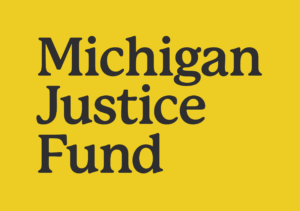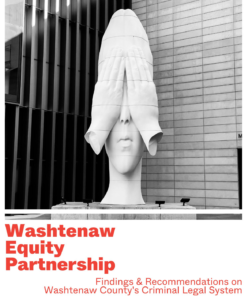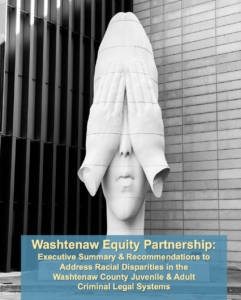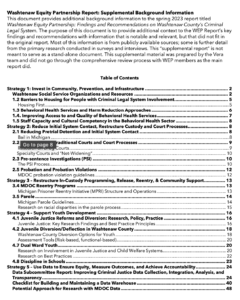Washtenaw Equity Partnership
Washtenaw Equity Partnership
Final Reports Released
The pursuit of racial equity in Washtenaw County’s criminal legal system took a major step forward with the release of a penetrating community report from Washtenaw Equity Partnership (WEP). Made possible by a substantial grant from the Michigan Justice Fund, the wide-ranging plan seeks to reduce racial disparities across all components of the County’s juvenile and adult criminal legal systems and articulates substantial recommendations for positive change at a critical point in our community, and society at large.
Founding Partners
The Washtenaw Equity Partnership seeks broad collaboration across the Criminal Legal System and with Community Organizations. Our founding partners include the following Washtenaw County Offices: Public Defender, Trial Court, Prosecutor, and the Board of Commissioners, along with Citizens for Racial Equity in Washtenaw (CREW). The Partnership engaged the Vera Institute of Justice to help facilitate the process.
How to Participate
Provide Feedback
We may occasionally post material for community feedback. Click here to submit a general comment.
Meet our team
For a list of Working Group and Subcommittee members, click here.
Read about the Working Group
You can find final versions of Working Group agendas, minutes and documents here.
Read about the Subcommittees
You can find final versions of Subcommittee agendas, minutes and documents here.
Chair
Alma Wheeler Smith, Community member
Members
Victoria Burton-Harris, Chief Assistant Prosecutor, Washtenaw County Prosecutor’s Office
Ché Carter, Principal, Huron High School
Belinda Dulin, Dispute Resolution Center
Alyshia Dyer, Poverty Solutions at UM; former Washtenaw County Sheriff’s Office Deputy
Jim Fink, Pittsfield Township Attorney
S. Joy Gaines, Community member; Attorney
Jeannette Hadden, Ozone House
Nichollette Hoard, Judicial Tenure Commission (formerly Washtenaw juvenile public defender)
Natalie Holbrook, American Friends Service Committee Michigan Criminal Justice Program
LaWanda Hollister, Community member; Avalon Housing
Deborah LaBelle, Community member; Attorney
Heather Martin, Youth Arts Alliance
Dan McNeil, Community member
Melvin Parson, We the People Opportunity Farm
Aubrey Patiño, Avalon Housing, Executive Director
Judge Miriam Perry, 15th Judicial District Court
Chief Marlene Radzik, Saline Police Department
MaryAnn Sarosi, Citizens for Racial Equity in Washtenaw
Eli Savit, Washtenaw County Prosecutor
Jeremiah Sawyer, Community member
Desirae Simmons, Interfaith Council for Peace & Justice
Peri Stone-Palmquist, Student Advocacy Center
Rachelle Wilson, Washtenaw County Prosecutor’s Office, Crime Victims Advocate and Witness Coordinator
When asked what a successful process would look like to them, Working Group members said,
Success would be ensuring that we hear from families and youth, giving them a voice and then taking that information and putting it to into action – something tangible based on what we’ve learned from them.
Is this the system we would create if we were starting over? If not, then let’s reimagine OUR system.
Significantly reduced disparity in the number of Black and other minority people going to jail or prison, that more people are introduced to productive alternatives to incarceration, that we intervene at much earlier years in the lives of young people to give opportunities to be successful.
Is it too large to think about the policies and systems in our schools and communities that contribute to “criminal” behavior.
To really look at ourselves, ask tough questions, resist the phrase “But that’s the way we’ve always done it,” and move toward a system that is healing and supportive and not just punishment oriented. That may involve justice reinvestment.
Real commitment, across sectors, to changing the system. The courage to not be hemmed in by inertia or retreat to “that’s the way things are done.” And both the plan and resources to facilitate the above.
I don’t expect perfection in our criminal legal system, but if we can improve it, make it closer to perfect, and do it in a way that can be replicated elsewhere, I would consider that a success – even more so if it leaves a clear map to further improvements.
I would like to see the discussion about mental healthcare and access to said healthcare become more entrenched in the legal process.
Criminal Justice Reform that aligns with community values and is supported with data, and is outcome focused.
There are so many policies and procedures that are barely rational let alone rooted in any evidence or value that are just perpetuated and cause harm. These need to be eliminated and resources allocated to actually ensure equitable, restorative processes that encourage dignity and bringing folks back into the community in better shape not worse.
The development of evidence-based strategies to eliminate racial inequities in the criminal legal system.
Making sure that our programs and supports aren’t tied to “system involvement”
 The Washtenaw Equity Partnership is made possible by committed, justice-driven individuals throughout Washtenaw County and the Michigan Justice Fund. The Michigan Justice Fund, an initiative of the Community Foundation for Southeast Michigan, is a collaborative effort committed to promoting and advancing the prosperity and dignity of Michigan residents by stemming the flow of individuals into the youth and criminal justice systems. The work of the initiative also supports the investment of public dollars to community-driven alternatives to incarceration and detention and supports programs that ensure those who are returning home after incarceration or detention receive the support they need to flourish.
The Washtenaw Equity Partnership is made possible by committed, justice-driven individuals throughout Washtenaw County and the Michigan Justice Fund. The Michigan Justice Fund, an initiative of the Community Foundation for Southeast Michigan, is a collaborative effort committed to promoting and advancing the prosperity and dignity of Michigan residents by stemming the flow of individuals into the youth and criminal justice systems. The work of the initiative also supports the investment of public dollars to community-driven alternatives to incarceration and detention and supports programs that ensure those who are returning home after incarceration or detention receive the support they need to flourish.


